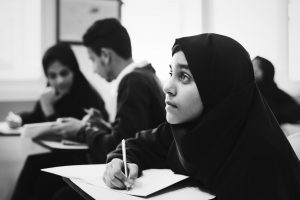With the COVID-19 pandemic engendering massive socio-economic disruptions in an unprecedented manner, education systems — significant social institutions — have been adversely impacted worldwide. While confronting a series of ills ailing its structure for many decades, the existing educational crisis in Pakistan was exacerbated by the pandemic starting in late February 2020, when Pakistan record its first cases. One of the first steps taken by the authorities in Pakistan to prevent the spread of COVID-19 was the closure of educational institutions.
It cannot be ignored that education holds immense significance for any nation to prosper and develop. But COVID-19 has dismantled traditional educational infrastructure as lockdowns were implemented which restricted the ability of the students to learn in an effective physical setting. Certainly, a sudden shift toward digital classrooms led to disturbances for students and teachers alike. The training of teachers, digital experience of students and other associated matters such as internet access, computer availability and so on also played a role.
Effective consultation and collaboration between ministries turned out to have positive outcomes for the educational framework. As countries worldwide sought to shift educational infrastructure from physical classes to online, Pakistan also tried to follow suit by launching the eTaleem portal and Taleemabad app to encourage remote learning via internet, TV or radio. However, access to the internet, as mentioned, remains a distant dream for the majority in Pakistan, and only a small segment of the population is privileged enough to get education through digital infrastructure.
The government nevertheless faced serious criticism on the part of students, demanding that exams be postponed or cancelled altogether given the upheaval in the education system.
Student concerns that a huge number of people undertaking exams in same hall might make them vulnerable to the virus, and also put their families at risk, is valid. Others believe that pandemic-induced lockdowns and, subsequently, closures of schools have disturbed the learning process, making students unprepared for the Cambridge exams.
Students across the country made their way toward high courts to challenge the physical hosting of Cambridge exams conducted by the Cambridge Assessment International Education (CAIE) which was later turned down by the courts. When the high courts dismissed their petition, students requested Prime Minister Imran Khan cancel the CAIE examination but to no avail.
All students wanted was “school-assessed grades” in place of physical exams, which cannot be productive, fruitful, and effective for students as this practice proved futile last year. Students without a proven track record of good grades still received an “A” as well as those who had a decent record. To ensure fairness, the Ministry of Educational and Professional Training chose to opt for physical examinations while taking into account health emergencies and strict lockdowns imposed across the country.
It is important to mention that the decision on conducting a physical CAIE examination instead of going for school-assessed grades has been made by federal and provincial education ministers, prominent education and other professionals in the larger interest of students. According to sources, physical examinations are being conducted in a highly effective manner as students are made to follow standard procedures to minimize risk.
The federal government also made sure that the Higher Education Commission (HEC) allows students who would take exams in the October-November session to delay admission in universities until January 2022. This way, they won’t be lagging behind students who are taking exams now. Significantly, the government has implemented several educational reforms that can bring about structural changes in curriculum, teaching methods, and infrastructure. In this regard, the single national curriculum (SNC) is a striking example aimed at eliminating educational discrimination prevalent in Pakistan.
It is troubling to note that Pakistan’s economy has been estimated to be suffering a loss of $67-155 billion if learning losses continue during the country’s third wave of COVID-19. To mitigate these losses, the World Bank offered $20 million to Pakistan to bolster an inclusive learning mechanism targeted at 19.1 million out-of-school children who might opt to support their families facing pandemic-induced financial hardships. This is also a significant achievement of the current government striving to restructure the educational sector in the country.
Extraordinary circumstances demand extraordinary actions. That said, it is equally important to highlight that the government needs to ensure that it is balancing decisions for the better future of students while keeping a check on the virus. One of the most important priority areas for the government is to improve the school-assessed grades mechanism. The commercial nature of private schools compelled them last year to improve the academic records of their students, regardless of actual merit.
Even more dangerous is when influential parents try to seek good grades for their kids by pressuring teachers and schools. To prevent this, the government should design a uniform policy for public and private schools where such irregularity can be mitigated and merit-based grades can be assigned to students. Furthermore, A2 students who will graduate this year might have an advantage over students who have been already awarded school-assessed grades. To ensure fairness, the government can frame policies where universities will not consider students’ admission based on merely student-assessed grades instead of entry tests and other entry-level requirements.
Undeniably, school systems have been facing an unprecedented crisis globally, which can only be taken care of if tough and timely decisions are made. Policymakers have a series of difficult choices to make, which can save students’ time and make the best out of this grim situation.

































